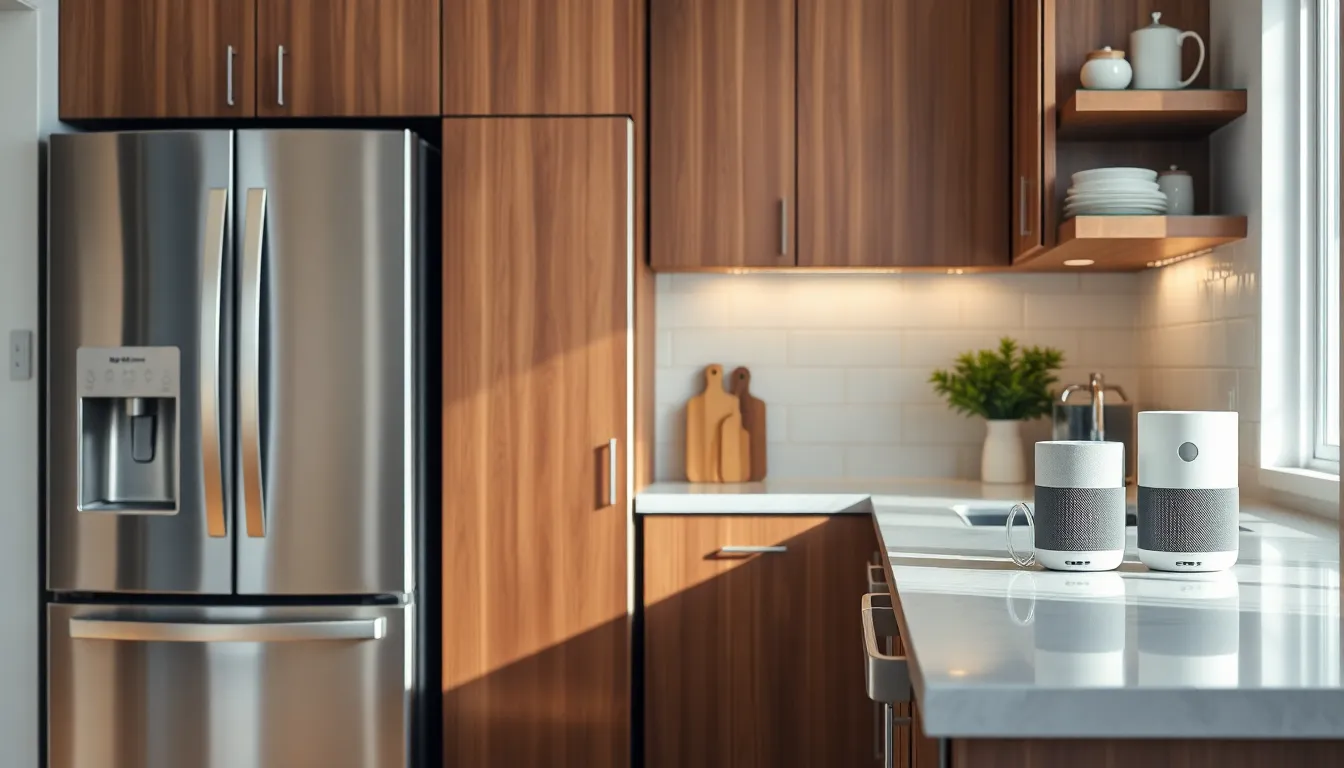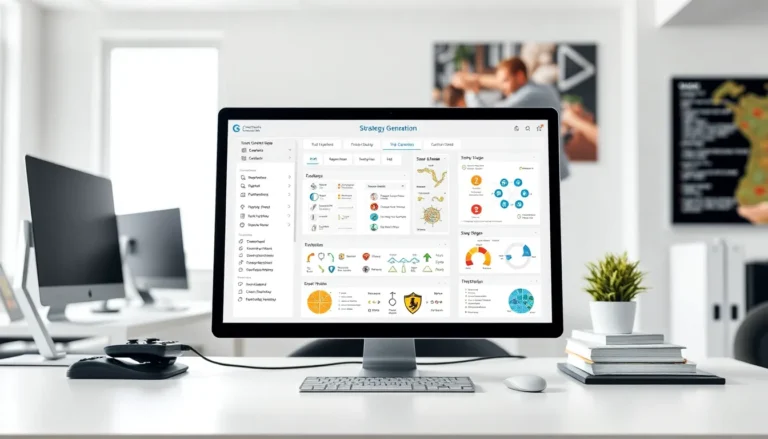In a world where the coffee maker can order your groceries and the thermostat knows your favorite temperature, upgrading home tech isn’t just a luxury—it’s practically a necessity. Imagine a home that anticipates your needs, turning mundane tasks into seamless experiences. Who wouldn’t want to kick back while their smart assistant dims the lights and plays their favorite playlist?
Table of Contents
ToggleImportance Of Upgrading Home Tech
Enhancing home technology improves daily living. Upgraded devices increase efficiency and save time, allowing individuals to focus on more important tasks. Convenience becomes a key benefit. Modern tech like smart thermostats can adjust temperatures remotely, optimizing energy usage.
Cost-effectiveness defines the financial impact of upgrading. Energy-efficient appliances reduce utility bills over time. Investing in newer technology often leads to long-term savings that offset initial expenses. Additionally, tech upgrades enhance property value, making homes more attractive on the market.
Security receives a significant boost with updated systems. Smart home security devices monitor activity, providing peace of mind. Video doorbells and smart locks enable homeowners to control access from anywhere, ensuring safety.
Interconnectivity enhances the user experience. Devices that communicate with one another create a seamless ecosystem. Integrating voice assistants allows users to control multiple devices through simple commands, making life easier and more enjoyable.
Stay current with trends and innovations to maximize benefits. The rapid pace of technological advancement means staying informed equates to maintaining a competitive edge. Embracing newer technologies aligns with lifestyle expectations, making home environments more comfortable and efficient.
Choosing to upgrade embraces sustainability. Many modern devices prioritize eco-friendly practices, reducing carbon footprints and supporting environmentally conscious living. By upgrading, homeowners actively contribute to a more sustainable future.
Smart technology adoption becomes increasingly crucial in today’s digital age. Upgrading home tech not only simplifies life but also ensures homes remain functional, secure, and aligned with contemporary standards. Upgraded systems enhance everyday experiences and promote overall wellbeing.
Popular Home Tech Upgrades

Upgrading home technology enhances daily life with convenience and efficiency. Here are some popular categories to consider.
Smart Home Devices
Smart home devices connect seamlessly, creating a unified system. Products like smart speakers, thermostats, and security cameras automate daily tasks and improve energy management. Voice-activated assistants enable users to control their environment hands-free. Light bulbs adjust brightness and color based on preferences, offering customizable ambiance. Moreover, smart locks enhance security by allowing remote access and monitoring. These technologies not only simplify routines but also provide valuable insights into energy consumption and usage patterns.
Energy-Efficient Appliances
Energy-efficient appliances play a significant role in sustainable living. Upgrading to appliances with Energy Star ratings reduces energy consumption significantly. For example, high-efficiency washers use up to 25% less water while delivering superior cleaning. Refrigerators equipped with advanced technology maintain optimal temperatures, minimizing energy waste. Moreover, modern dishwashers offer quick cycles that use less water and power without compromising performance. These upgrades lower utility bills while enhancing home value, making them a smart investment for any homeowner.
How To Choose The Right Upgrades
Choosing the right upgrades requires careful consideration of individual needs and budget constraints. Prioritizing essential features leads to better decisions that enhance daily living.
Assessing Your Needs
Identifying personal needs forms the foundation of effective upgrades. Consider lifestyle preferences for convenience—smart speakers streamline control of home devices while smart thermostats optimize energy use. Evaluate current technology for gaps that could benefit from upgrades, such as outdated appliances that consume excess energy. Analyze habits and routines; understanding daily patterns helps in selecting functionalities that save time. Research popular devices and features aligning with specific requirements. Ensuring compatibility among new additions guarantees a seamless user experience in the smart home ecosystem.
Budget Considerations
Establishing a budget significantly influences the upgrading process. Determine how much is available for home tech enhancements while considering long-term returns on investment. Energy-efficient appliances, though sometimes pricier upfront, often reduce utility bills, enhancing savings over time. Compare various brands and models to find options within the price range that meet essential needs. Factor in installation costs along with device prices for an accurate financial picture. Explore financing options or promotions that can ease initial expenses, ensuring affordable yet effective upgrades. Balancing quality and affordability leads to satisfying choices that improve home functionality.
The Impact Of Upgrades On Daily Life
Upgrading home technology significantly enhances the quality of daily life. Convenience takes center stage as smart home devices automate mundane tasks. Imagine waking up to a freshly brewed coffee and a perfectly adjusted thermostat, allowing individuals to start their day comfortably.
Efficiency improvements stand out when transitioning to energy-efficient appliances. These devices not only reduce utility bills but also elevate the property value over time. Enhanced security systems provide peace of mind; smart cameras and monitoring devices enable homeowners to oversee their properties remotely.
Interconnectivity among gadgets creates a seamless experience. Smart speakers, connected lights, and other devices work together, making control effortless through voice commands. Upgrades can also contribute to a more sustainable lifestyle; eco-friendly practices are essential in today’s world.
Evaluating personal habits before upgrading ensures the right choices are made. Understanding needs allows individuals to select technologies that simplify routines and save valuable time. Budget remains a crucial factor; considering financial limits helps prioritize the most impactful technologies.
Engaging with current trends ensures that homes remain functional and modern. Homeowners who stay informed maximize the benefits of their upgrades. Embracing smart technology fosters comfortable living conditions while aligning with contemporary standards.
Potential Challenges When Upgrading
Upgrading home technology presents specific challenges. Budget constraints often arise as upgrades can become expensive, especially with high-tech investments like smart appliances and security systems. Compatibility issues commonly occur when integrating new devices with existing systems, leading to potential disruptions.
Time management plays an important role during the upgrading process. Installing new tech, particularly for complex systems, can make schedules tight and frustrating. Consumer knowledge also poses a challenge, as users must stay informed about products and trends to make educated decisions.
Maintenance requirements change with upgraded devices. Users may find they need to spend additional time ensuring everything operates smoothly and efficiently. The learning curve for new technology can disrupt daily routines, as adaptions may take longer than expected.
User expectations can exceed the reality of upgraded devices. Desiring seamless interconnectivity among devices can lead to disappointment if products do not perform as anticipated. Additionally, changes in household dynamics can affect how well tech serves everyone’s needs.
Security risks also warrant caution during upgrades. Enhanced devices can introduce vulnerabilities if not properly secured, making vigilance crucial. Consequently, homeowners must remain informed about potential threats and take necessary precautions to protect their privacy.
In sum, while upgrading home technology offers numerous benefits, individuals must navigate these challenges effectively. Balancing budget, time, knowledge, and security becomes essential for a successful tech upgrade journey.
Upgrading home technology is a powerful way to enhance daily living. It not only simplifies routines but also promotes energy efficiency and security. By investing in smart devices and appliances, homeowners can enjoy a more connected and convenient lifestyle.
Navigating the upgrade process requires careful consideration of individual needs and budget constraints. Staying informed about the latest trends and innovations is essential for making the right choices. With the right upgrades, individuals can transform their homes into efficient and sustainable spaces that cater to their unique preferences.
Embracing these advancements ultimately leads to a more comfortable and secure living environment, aligning with modern expectations while contributing to a sustainable future.



